In the board game Monopoly, players aim to buy, trade, and develop properties while trying to drive their opponents into bankruptcy.
There are two Utilities present in Monopoly UK and Monopoly US editions which are Water Works and Electric Company.
Players can only purchase one of each utility per game, so it is vital to choose wisely. This guide will provide rules and strategies for monopoly utilities to make the most of your investment.
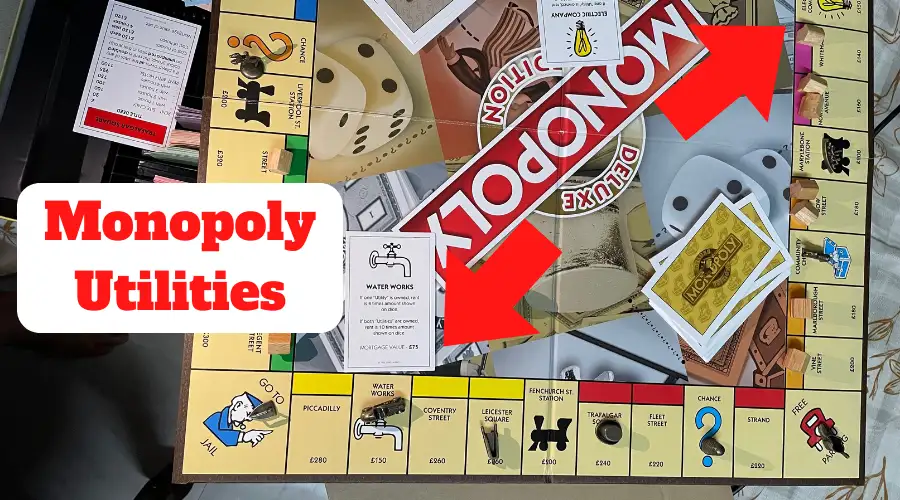
Let’s get started!
What are the utilities in Monopoly?
Monopoly utilities are properties that do not have any fixed rent and their rent depends on the dice roll. Also, these utility properties cannot be developed more by building hotels and houses like other spaces on the Monopoly Board.
There are only two utilities in many game versions – Electric Company and Water Works.
In Monopoly Revolution, however, there are also Gas Company and Communications Company.
Electric Company: Increases rent by four times the number shown on the dice.
Water Works: Increases rent by ten times the number shown on the dice.
Owning Utilities: Increases rent by, even more, depending on the number shown on the dice.
All four of these rents are different every time a player lands on them, so the amount of rent the player owes each time they land on a particular property is always a mystery.
This makes Monopoly a very unpredictable game, and it can be very rewarding to be the first player to collect all the rent on a property.
Electric Company
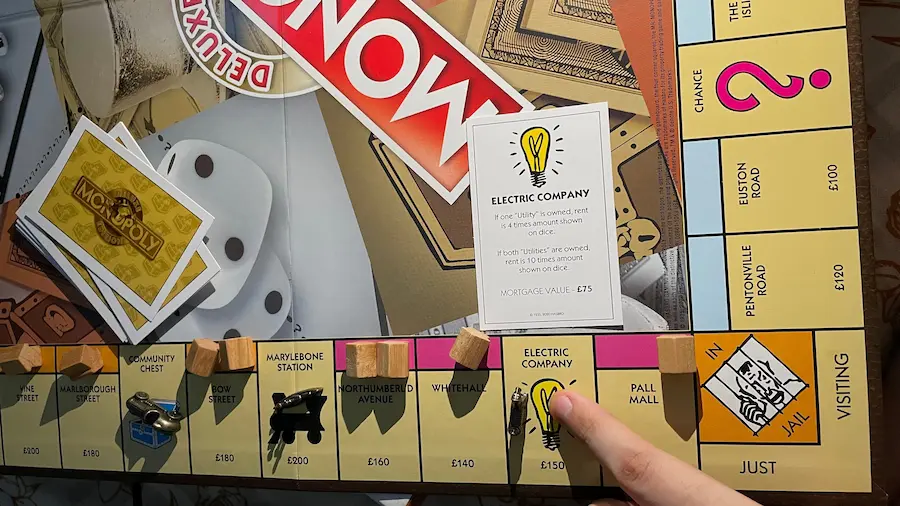
-Has the same statistics as Water Works
-Located between St. Charles Place and States Avenue in the Monopoly US Edition. It is located between Whitehall and Pall Mall in the Monopoly UK Edition.
-Based on the amount of money rolled on the dice rather than the number of houses or hotels
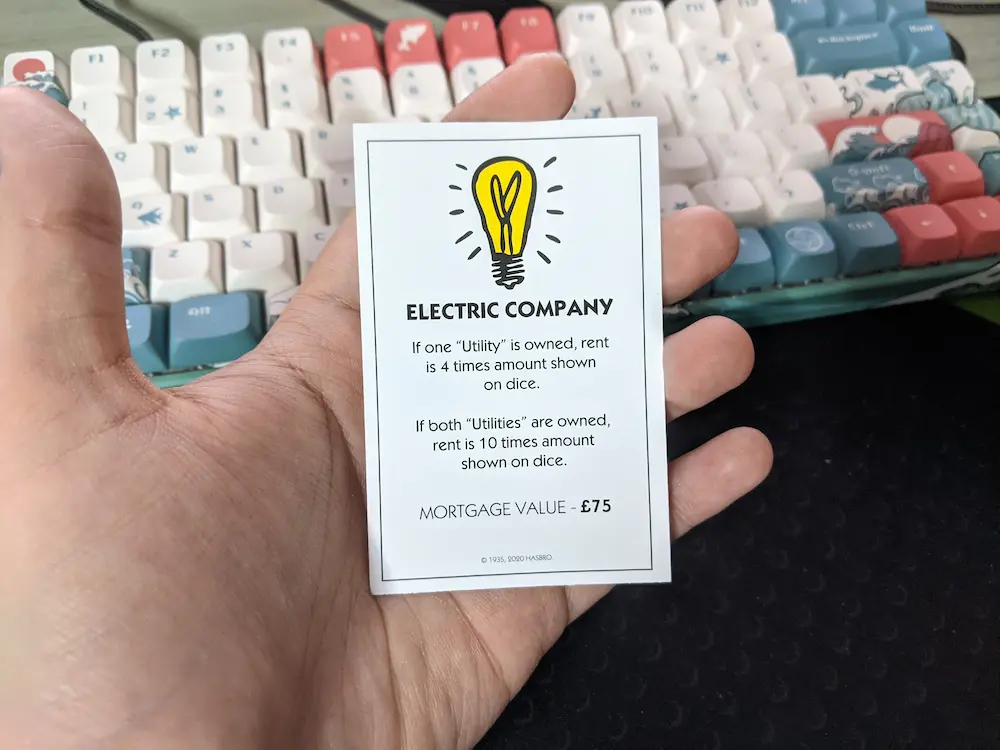
The Electric Company has a mortgage value of $75, which means that players need to pay an additional $150 to own it.
The player gains an equal amount of income from the value of whatever dice have landed multiplied by the amount owed if they land on the Electric Company and the Water Works.
The Electric Company is a great tool for players who want to gain an advantage over their opponents. By owning this utility, players can charge high rents to their opponents, making it difficult for them to compete.
Additionally, the Electric Company provides power to other properties on the board, so keeping it in good condition is important.
Water Works
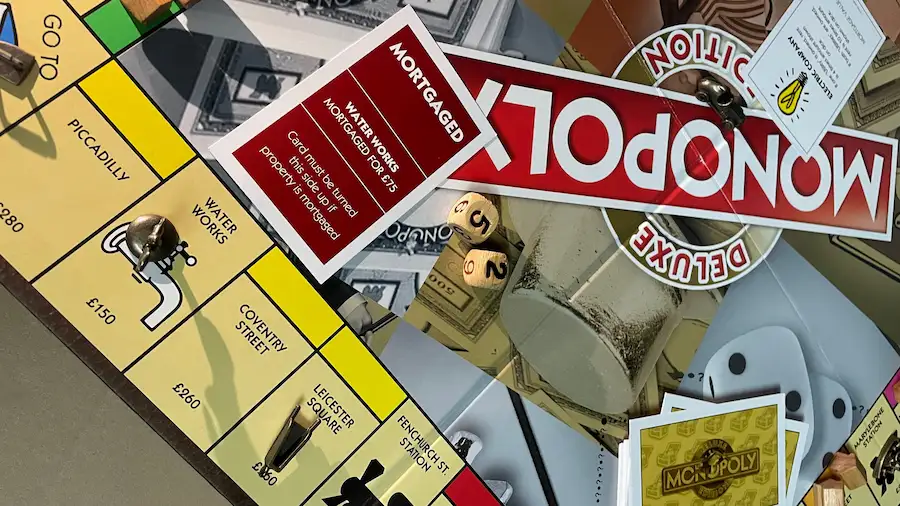
You’ll have to rent the Water Works four times the number shown on the dice as well as if you have the Electric Company, which is worth ten times combined the amount currently shown on the dice.
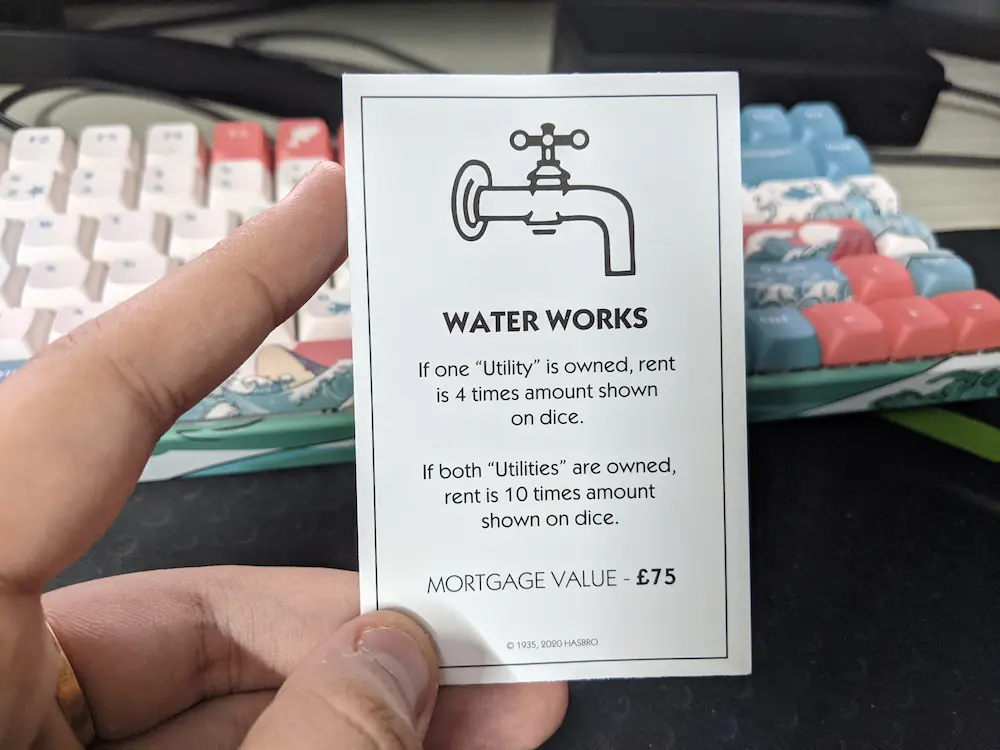
Hence, Water Works can be valuable, especially if you collect rent regularly. Be sure to plan your moves carefully, as landing on Water Works can be costly!
How does utility work in Monopoly?
Water Works or The Electric Company charges $150 and it depends on the dice you will get, so that price will be multiplied, which pays for both services.
To purchase one or both of the services, you’ll be charged $300 at a minimum.
Do you ever wish you could own both utilities on a Monopoly board?
Well, you’re not alone! Many people find that owning both utilities can be a great way to boost your income and take control of the board.
But, if you only own one utility, you may wonder what the rent for this space is. And, if you own both utilities, you may wonder how rent is calculated for those spaces.
So, whether you only own one utility or both, it’s important to familiarize yourself with the rent for each space on the Monopoly board.
This way, you can make the most of your opportunities and boost your income!
In short, using the same dice roll to land on rent for a vast space for Monopoly equals four times the cost.
So, if the user landed on the space, the rent would be four times the value of the roll. If the user landed on an additional utility space, the rent would be ten times the value of the roll.
Monopoly Utility Strategy
When it comes to owning Monopoly utilities, it can be a bit of a gamble. However, if you play smart, you can make much money.
For example, the Water Works utility is a great investment if you can land on it. If you can charge high rent, you can quickly become one of the wealthiest players on the board.
The Electric company is also a great option if you can get it. Not only can you charge high rates for power, but you can also make a lot of money by selling off your Electricity to other players.
So, if you’re looking to make a quick buck in Monopoly, consider investing in one of the Monopoly utilities. Just be sure to play smart – you don’t want to go bankrupt like some opponents!
If you’re considering including Monopoly utilities on your game board, ensure they’re worth the investment by calculating their return on investment (ROI). Both are particularly lucrative options, with high returns on investment thanks to their ability to increase rent rolls if a player lands on them.
Are utilities good in Monopoly?
Not exactly. If you want to make some extra money, you might consider buying the Monopoly utilities.
By owning both, you’ll receive 2.5X more rent every time, and the chance of landing on your utilities (if you have both) can increase your earnings by up to 2.5X.
So, it depends on the personal situation you’re playing in. However, if you’re looking to make some extra money and don’t have either of the utilities, you’ll still be able to make some money by landings on properties.
The value of the utilities decreases as the match progresses, and the number of chances to earn rent increases.
With the opportunity to earn rent, buying utilities also allow you to avoid owing rent if you acquire them again. In a two-player match, that advantage becomes increasingly more important.
To make a profit from both, you will need to earn between three and fifteen landings, with an average rental of $70. Remember that when you have both utilities, you have twice the potential of earning a decent profit.
- An average of six deals to make a profit
- Take trips with other players to earn money
- Rent is typically around Twenty-eight USD
Both can both be profitable for you when taken for yourself.
Pros of Utilities in Monopoly
There are many pros to including utilities in a Monopoly game. They can add strategy and interesting decision-making to the game and depth and longevity to the experience.
First and foremost, utilities can help to create a more complex game. Players need to consider the available utilities and how to use them to their advantage, which can add a level of strategy to the game that is not always present when only land, money, and buildings are available.
Second, utilities can be a source of income. By placing utilities on key squares, players can generate revenue each turn. This can be a valuable source of income, especially in longer games, and can be used to buy more important assets or build more powerful buildings.
Third, utilities can be a source of power. By owning key utilities, players can control key areas of the board, giving them an advantage in the game.
Finally, utilities can add a level of interactivity to the game. The game can become more interactive and challenging by making certain utilities available only at certain times or in certain locations.
All of these reasons make utilities a valuable addition to a Monopoly game.
Cons of Utilities in Monopoly
In Monopoly, Water Works and Electric Company are not as valuable. Your opponents will acquire you a couple of successes before outgrowing the return value.
There are various ways to start investing in a monopoly without breaking the bank and eventually going bankrupt. If you’re looking to start small, there are some affordable alternatives available.
In a Monopoly game, if you had a single utility, your opponent would need to roll the dice an average of one hundred and ninety-nine times during a period to turn a profit.
If both utilities were yours, they would have to roll about seventy-nine-fold for the payoff to be profitable for you.
Some rolls might take more or less than the number of rolls made by your opponent, which is dependent on the number they roll when they arrive at your property.
It can be challenging to determine the average number of turns for players of Monopoly using this system.
On average, a number of 30 and 100 turns are necessary per player, but that number can vary depending on factors such as the number of people playing and the game being played.
What is the chance of landing on Water Works or Electric Company each turn?
On each roll of the dice, a player has a 2.6 percent chance of landing on Electricity, a 2.8 percent chance of landing on Water Company, and a 5.4 percent chance of landing on either of the mentioned utilities.
Should you buy waterworks in Monopoly?
Statistically, it’s unlikely that you will end up with the prized property of the Water Works – but that doesn’t mean you should avoid them in Monopoly.
A recent study by probabilistic researchers has found that players have a 2.8% most probable probability on the Electric Company then on the Water Works.
This means that, by playing smart, you have a chance of winning even if the odds seem stacked against you. So don’t be afraid to take advantage of the opportunities that Monopoly provides!
Despite this small advantage, it’s still worth investing in Water Works if possible, as it can be advantageous in the long run.
For example, if you own the Water Works, you can charge higher rents to players. Additionally, you can use the water to power your properties, which can help you build up your wealth faster.
So, while it’s not always likely that you’ll end up with the waterworks, it’s always worth considering whether or not to buy them. If you decide to buy it, don’t get your hopes up.
Is a railroad a utility in Monopoly?
Railroads are utilities in the Monopoly game, as they are classified as a “railroad” in the rules.
They can be considered one of the most important pieces of equipment in the game, as they allow players to move around the board more easily and make more money.
The Waterworks and Electric Company function as the 5th and 6th railroads in the game, and their prices are the same as the other railroads. They can be liquidated and mortgaged for one hundred USD.
Railroads are worth four hundred dollars and eight hundred dollars If you get an Advance to Nearest Utility card, you can restore play or remove it.
Alternatively, these cards can be removed before the beginning of the game.
How much is the rent for the Electric Company in Monopoly?
If you’re playing Monopoly, one of the utilities you may need to take control of is the Electric Company. The Electric Company in Monopoly costs $150, but if you own one of its properties, the rent is four times the number on the dice that landed you on the utility. If you land on the Electric Company with the number 3, the rent is $450.
Conclusion
Let’s conclude the post on Monopoly Utilities with Rules and Strategies!
The guide is easy to follow and provides a great resource for players of all experience levels.
With its clear instructions and helpful tips, the Monopoly Utilities Complete Guide is a must-have for anyone looking to dominate the utility game!
What’s Next?
You can check the different Official Monopoly Rules Here in this guide.
Here are Unofficial and Fan Made Monopoly House Rules too to spice up your game.
